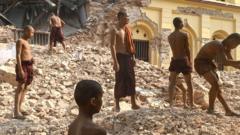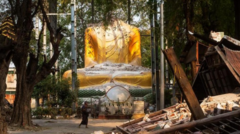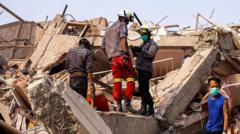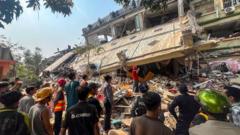The recent earthquake in Myanmar highlights the challenges posed by ongoing internet censorship, limiting critical information during national crises.
Myanmar's Digital Isolation Hinders Earthquake Response

Myanmar's Digital Isolation Hinders Earthquake Response
Censorship and Internet Restrictions Complicate Relief Efforts After 7.7-Magnitude Quake
In the aftermath of a powerful 7.7-magnitude earthquake that struck near Mandalay, Myanmar, the international community has been largely unable to assess the full scope of the disaster due to the country’s severe internet restrictions. Following the natural disaster, videos and images from neighboring Thailand circulated on social media, while Myanmar struggled to maintain an online presence. This situation is a sobering reminder of the challenges posed by the ruling military junta's strict censorship policies that have been in place since the coup in 2021.
The military's control over telecommunications has resulted in frequent internet shutdowns and a reliance on social media blocks that impede not only freedom of expression but also the flow of essential information during emergencies. This has led to an information vacuum, complicating aid efforts for those affected by the earthquake. Even official government sites faced outages, leaving officials unable to provide updates.
Certain regions of Myanmar, particularly those experiencing conflict with the military, see limited internet access; however, some residents have turned to satellite-based services like Starlink to circumvent these restrictions. Joe Freeman, a researcher with Amnesty International, stated that the internet censorship's repercussions are evident in the contrasting breadth of coverage between Myanmar and Thailand, where the impact of the quake has been extensively documented.
Freeman emphasized the pre-coup era’s stark contrast to the current environment, noting the surge in social media engagement during past crises such as the Covid pandemic, where information proliferated rapidly. With the latest earthquake, the lack of accessible details continues to hinder relief measures, leaving Myanmar in a precarious position as the nation processes both the natural disaster and the imposition of military control over digital spaces.
The military's control over telecommunications has resulted in frequent internet shutdowns and a reliance on social media blocks that impede not only freedom of expression but also the flow of essential information during emergencies. This has led to an information vacuum, complicating aid efforts for those affected by the earthquake. Even official government sites faced outages, leaving officials unable to provide updates.
Certain regions of Myanmar, particularly those experiencing conflict with the military, see limited internet access; however, some residents have turned to satellite-based services like Starlink to circumvent these restrictions. Joe Freeman, a researcher with Amnesty International, stated that the internet censorship's repercussions are evident in the contrasting breadth of coverage between Myanmar and Thailand, where the impact of the quake has been extensively documented.
Freeman emphasized the pre-coup era’s stark contrast to the current environment, noting the surge in social media engagement during past crises such as the Covid pandemic, where information proliferated rapidly. With the latest earthquake, the lack of accessible details continues to hinder relief measures, leaving Myanmar in a precarious position as the nation processes both the natural disaster and the imposition of military control over digital spaces.























